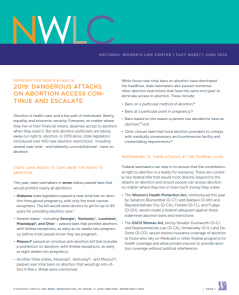 2019: Dangerous Attacks on Abortion Access Continue and Escalate
2019: Dangerous Attacks on Abortion Access Continue and Escalate
Abortion is health care, and a key part of individuals’ liberty, equality, and economic security. Everyone, no matter where they live or their financial means, deserves access to abortion when they need it. But anti-abortion politicians are taking away our right to abortion. In 2019 alone, state legislators introduced over 400 new abortion restrictions,[1] including several near total – and blatantly unconstitutional – bans on abortion.
State Laws Meant to Take Away the Right to Abortion
This year, state lawmakers in seven states passed laws that would prohibit nearly all abortions:
- Alabama state legislators passed a near total ban on abortion throughout pregnancy, with only the most narrow exceptions. The bill would send doctors to jail for up to 99 years for providing abortion care.[2]
- Several states – including Georgia,[3] Kentucky,[4] Louisiana,[5] Mississippi,[6] and Ohio[7] – passed laws that prohibit abortion, with limited exceptions, as early as six weeks into pregnancy, before most people know they are pregnant.
- Missouri[8] passed an omnibus anti-abortion bill that includes a prohibition on abortion, with limited exceptions, as early as eight weeks into pregnancy.
- Another three states, Arkansas,[9] Kentucky,[10] and Missouri,[11] passed near total bans on abortion that would go into effect if Roe v. Wade were overturned.
While those near total bans on abortion have dominated the headlines, state lawmakers also passed numerous other abortion restrictions that have the same end goal: to eliminate access to abortion. These include:
- Bans on a particular method of abortion;[12]
- Bans at a particular point in pregnancy;[13]
- Bans based on the reason a person has decided to have an abortion;[14] and
- Clinic closure laws that force abortion providers to comply with medically unnecessary and burdensome facility and credentialing requirements.[15]
Responding to these Attacks at the Federal Level
Federal lawmakers can step in to ensure that the constitutional right to abortion is a reality for everyone. There are currently two federal bills that would most directly respond to the attacks on abortion and ensure people can access abortion no matter where they live or how much money they make:
- The Women’s Health Protection Act, reintroduced this year by Senators Blumenthal (D-CT) and Baldwin (D-WI) and Representatives Chu (D-CA), Frankel (D-FL), and Fudge (D-OH), would create a federal safeguard against these state-level abortion bans and restrictions.
- The EACH Woman Act, led by Senator Duckworth (D-IL) and Representatives Lee (D-CA), Schakowky (D-IL) and DeGette (D-CO), would restore insurance coverage of abortion to those who rely on Medicaid or other federal programs for health coverage and allow private insurers to provide abortion coverage without political interference.
[1] State Policy Updates, Guttmacher Institute (June 1, 2019), https://www.guttmacher.org/state-policy.
[2] H.B. 314, 2019 Leg., Reg. Sess. (Ala. 2019). The bill was scheduled to take effect in November, but Alabama abortion providers filed a lawsuit in the United States District Court for the Middle District of Alabama, to block enforcement of the law.
[3] H.B. 481, 2019-2020 Leg., Reg. Sess. (Ga. 2019). The law is scheduled to take effect in January 2020.
[4] S.B. 9, 2019 Leg., Reg. Sess. (Ky. 2019). The measure was immediately blocked by a federal court pending further litigation. EMW Women‘s Health Ctr. v. Beshear, No. 3:19-cv-178-DJH, 2019 WL 1233575 (W.D. Ky. Mar. 15, 2019).
[5] S.B. 184, 2019 Leg., Reg. Sess. (La. 2019).
[6] S.B. 2116, 2019 Leg., Reg. Sess. (Miss. 2019). This law has been blocked by a federal court. Jackson Women‘s Health Org. v. Dobbs, No. 3:18-cv-171-CWR-FKB, 2019 WL 2230532, (S.D. Miss. May 24, 2019).
[7] S.B. 23, 133d Gen. Assemb., Reg. Sess. (Ohio 2019).
[8] H.B. 126, 100th Gen. Assemb., 1st Reg. Sess. (Mo. 2019).
[9] S.B. 149, 92d Gen. Assemb., Reg. Sess. (Ark. 2019).
[10] H.B. 148, 2019 Leg., Reg. Sess. (Ky. 2019).
[11] H.B. 126, 100th Gen. Assemb., 1st Reg. Sess. (Mo. 2019).
[12] Indiana and Missouri passed laws that ban a safe method of abortion, with limited exceptions. North Dakota passed a ban on a particular method of abortion that would go into effect if Roe v. Wade were overturned. See H.B. 1211, 121st Gen. Assemb., Reg. Sess. (Ind. 2019); H.B. 126, 100th Gen. Assemb., 1st Reg. Sess. (Mo. 2019); H.B. 1546, 66th Leg. Assemb., Reg. Sess. (N.D. 2019).
[13] Arkansas and Utah passed laws that prohibit abortion, with limited exceptions, 18 weeks after a pregnant person’s last menstrual period. See H.B. 1439, 92d Gen. Assemb. Reg. Sess. (Ark. 2019); H.B. 136, 2019 Leg., Gen. Sess. (Utah 2019).
[14] Arkansas, Kentucky, Missouri, Utah passed laws with limited exceptions that prohibit abortion because of a fetus’s diagnosis or potential diagnosis of Down Syndrome or other fetal anomaly. Kentucky and Missouri passed laws banning abortion, with limited exceptions, due to a fetus’s race, sex, or national origin. See S.B. 2, 92d Gen. Assemb., Reg. Sess. (Ark. 2019); H.B. 5, 2019 Leg., Reg. Sess. (Ky. 2019). The law was immediately blocked by a federal court and will not go into effect while litigation against it proceeds. EMW Women’s Surgical Ctr. v. Beshear, No. 3:19-cv-178-DJH, 2019 WL 1233575 (W.D. Ky. Mar. 15, 2019); H.B. 126, 100th Gen. Assemb., 1st Reg. Sess. (Miss. 2019); H.B. 166, 2019 Leg., Gen. Sess. (2019).
[15] Legislatures in Arkansas and Louisiana passed medically unnecessary, burdensome restrictions. See S.B. 278, 92d Gen. Assemb., Reg. Sess. (Ark. 2019); S.B. 448, 92d Gen. Assemb., Reg. Sess. (Ark. 2019); S.B. 484, 2019 Leg., Reg. Sess. (La. 2019).

 2019: Dangerous Attacks on Abortion Access Continue and Escalate
2019: Dangerous Attacks on Abortion Access Continue and Escalate